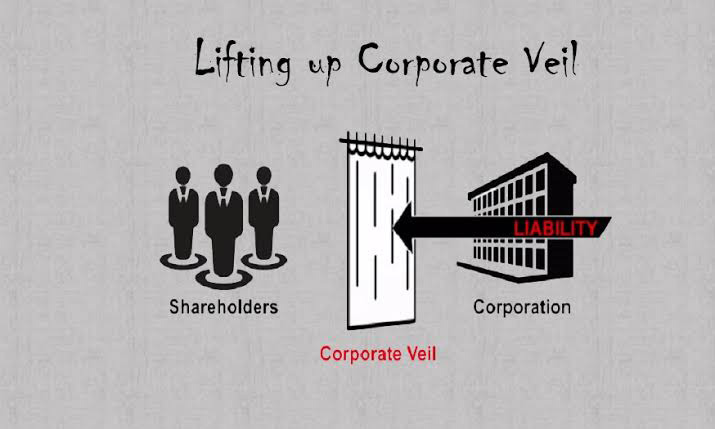Table of Contents
Introduction
The doctrine of lifting the corporate veil means ignoring the corporate nature of the body of individuals incorporated as a company. A company is a juristic person, but in reality it is a group of people who are the beneficial owners of the property of the corporate body. Being an artificial person, it (company) cannot act on its own, it can act only by natural persons. The doctrine of lifting the veil can be understood as the identification of the company with its members. The company is equal in law to a natural person. This is one of the cornerstones of Indian Company Law and has been followed since 1897.
In the case of Salomon Vs. Salomon & Co. Ltd. 1897 it was considered from the Justice point of view “a company is a legal person distinct from its members. This principle is regarded as a veil/curtain/shield but not a wall between the company and its members. The effect of this principle is that there is a fictional veil and is permitted to look at the person behind the veil.”
According to this principle, when a company has been formed and registered under the Companies Act, all dealing with the company will be in the name of the company and the person behind the company will be disregarded however important they may be.
Meaning & Definition Of Corporation Veil
A corporate veil is a legal concept that separates the acts done by the companies and organizations from the actions of the shareholders. It protects the shareholders from being liable for the actions done by the company. This is not an absolute right the court depending on the facts of the case can take the decision whether the shareholder is liable or not.
According to the Cambridge Dictionary, “Shareholders may hide behind the corporate veil, assured that their liability does not extend beyond the value of their shares”.
According to the definition of Black Law Dictionary, “piercing the corporate veil is the judiciary act of imposing liability on otherwise immune corporate officers, Directors and shareholders for the corporation’s wrongful acts.”
Aristotle says, “when one talks of lifting status of an entity corporate veil, one has in mind a process whereby the corporate is disregarded and the incorporation conferred by statute is overridden other than the corporate entity an act of the entity.”
Company As A Corporate Personality
Corporate personality is the reality expressed by the law that a company is perceived as a legal entity distinct from its members. A company with such recognition and personality will be considered as a separate legal entity having an independent legal existence from the members of the company. A company is known by its own name and has its own rights, duties, obligations, and liabilities. Therefore, there is a clear difference between the company and its members, this is commonly called a Corporate Veil as discussed above.
The separate legal entity is the basic feature on which company law is premised. Establishing how a company comes into existence and how it is managed and functioned all depends on the legal entity of the company. The concept of a separate legal entity is not new and contrastingly there are many cases and litigation on this topic and on its jurisdiction. There are two very important judgments on separate legal entities, one of them is Salomon vs Salomon and Lee vs Lee, both cases are foreign but are applicable and accepted universally.
In both these cases it was held that ” The Company was a separate person member, and It has an identity different from its members and therefore, the unsecured creditors were to be paid at priority from the secured debentures”. This Judgement is very important with respect to Indian companies act as it lays the precedent that a company has a separate legal entity and it can enter into contracts with its own members.
Circumstances under which the Corporate Veil can be Lifted
There are two circumstances under which the Corporate Veil can be lifted. They are:
1: Statutory Provisions
2: Judicial Interpretations
Statutory Provisions
Section 5 of the Companies Act, 2013- This particular section characterizes the distinctive individual engaged in wrongdoing or a conduct which is held to be wrong in practice, to be held at risk in regard to offenses as ‘official who is in default’. This section gives a rundown of officials who will be at risk to discipline or punishment under the articulation ‘official who is in default’ which includes within itself, an overseeing executive or an entire time chief.
Section 45 of the Companies Act, 2013- Reduction of membership beneath statutory limit: This section lays down that if the individual count from an organization is found to be under seven on account of a public organization and under two on account of a private organization (given in Section 12) and the organization keeps on carrying on the business for over half a year, while the number is so diminished, each individual who knows this reality and is an individual from the organization is severally at risk for the obligations of the organization contracted during that time.
In the case of Madan lal v. Himatlal & Co. the respondent documented a suit against a private limited company and its directors because he had to recover his dues. The directors opposed the suit on the ground that at no time did the company carry on business with individual count which was to go below the statutory minimum and in this manner, the directors couldn’t be made severely at risk for the obligation being referred to. “It was held that it was for the respondent being dominus litus, to choose the people himself who he wanted to sue.”
Section 147 of the Companies Act, 2013 Misdescription of name: Under sub-section (4) of this section, an official of an organization who signs any bill of trade, hundi, promissory note, check wherein the name of the organization isn’t referenced in the way that it should be according to statutory rules, such official can be held liable on the personal level to the holder of the bill of trade, hundi and so forth except if it is properly paid by the organization. Such a case was seen on account of Hendon v. Adelman.
Section 239 of the Companies Act, 2013
Power of inspector to explore affairs of another company in the same gathering : It gives that in the event that it is important for the completion of the task of an inspector instructed to research the affairs of the company for the supposed wrong-doing, or a strategy which is to defraud its individuals, he may examine into the affairs of another related company in a similar group.
Section 275 of the Companies Act, 2013
Subject to the provision of Section 278, this section provides that no individual can be a director of in excess of 15 companies at any given moment. Section 279 furnishes for a discipline with fine which may reach out to Rs. 50,000 in regard of every one of those companies after the initial twenty.
Section 307 & 308 of the Companies Act, 2013 Section 307 applies to each director and each regarded director. The register of the shareholders should contain in it, not just the name but also how much shareholding, the description of shareholding and the nature and extent of the right of the shareholder over the shares or debentures.
Section 314 of the Companies Act, 2013
The object of this section is to restrict a director and anybody associated with him, holding any business which provides compensation if the company supports it.
Section 542 of the Companies Act, 2013
Pretentious Conduct: If over the span of the winding up of the company, it gives the idea that any business of the company has been continued with goal to defraud the creditors of the company or some other individual or for any deceitful reason, the people who were intentionally aware of this and still agreed to the carrying on of the business, in the way previously mentioned, will be liable on a personal level without incurring the liabilities of the company, and will be liable in a manner as the court may direct.
In Popular Bank Ltd, it was held that the Section 542 seems to leave the Court with attentiveness to make an assertion of risk, in connection to ‘all or any of the obligations or liabilities of the company’.
Judicial Proceedings
Subhra Mukherjee v. Bharat Coking Coal Ltd.
In this situation, Hoax or façade is being talked about. A private coal company sold its real estate to the spouses of executives before nationalization of the company. Truth be told,archives were tweaked and back-dated to corroborate that the deal of the selling of the real estate to the wives of the directors was before nationalization of the company. Where such exchange is claimed to be a hoax and deceitful, the Court was supported in piercing the veil of incorporation to discover the genuine idea of the exchange as to realize who were the genuine parties to the deal and whether it was real and in good faith or whether it was between the married couples behind the façade of the different entity of the company.
Bajrang Prasad Jalan v. Mahabir Prasad Jalan
This case is about a Subsidiary Holding Company. The court, to consider an objection of mistreatment held that the corporate veil can be lifted in the instances of not simply of a holding company, but also its subsidiary when both are belonging to the parent organisation.
N.B. Finance Ltd. v. Shital Prasad Jain
In this case, the High Court of Delhi allowed to the offended party organization a stay order which restrained the company of the defendant from alienating the properties that they owned on the ground that the defendant had borrowed money fraudulently from the plaintiff companies and the defendant had purchased properties in the name of the defendant companies. The court in this case did not award protection under the piercing of the corporate veil.
Jones v. Lipman
In this case, the merchant of a real estate property tried to dodge the particular execution of a contract for the clearance of the land by passing on the land to a company which he shaped for the reason and along these lines, he attempted to abstain from finishing the property deal of his home to the offended party. Russel J. depicting the company as a “devise and a hoax, a veil which he holds before his face and endeavors to stay away from acknowledgment by the eye of equity” and requested both the litigant and his company explicitly to fulfil the obligations of the contract to the offended party.
Exceptions Of Lifting Of Corporate Veil
The corporate veil of a company will be lifted only in exceptional cases such as follows;
Under statutory provisions:
Reduction of number of members below statutory minimum
In the case of a public company with less than seven members and three directors and
In the case of a private company with less than 2 members and 2 directors. Severally liable for the payment of whole debts of the company contracted during that time and may be severally sued thereof.
Failure to refund application fee
Under Section 39 of the Companies Act, 2013 the director of the company shall be jointly and severally liable to repay that money with interest at the rate of 6% per annum from the expiry of the 133 days if they fail to repay the application money without interest within 120 days when the company fails to allot shares.
Mis-description of company’s name
Under Section 12 of the Companies Act, 2013 if an officer of a company signs, or authorizes to be signed, on behalf of the company, any bill of exchange, hundi, promissory note, endorsement, cheque or order for money or goods wherein its name is not mentioned, apart from penal liability, the officer becomes personally liable on those instruments.
Fraudulent Trading
Under Section 339 of the Companies Act, 2013 every person knowingly a party to the carrying on of the business in the manner aforesaid, shall be punishable with imprisonment for a term which may extend to two years or with fine which may extend to fifty thousand or with both.
Holding and Subsidiary Company
Separation is ignored for the purpose of group accounts.
For investing in a company’s ownership
Under Section 216 of the Companies Act, 2013 the central government may appoint inspectors to investigate and report on the membership of any company for the purpose of determining the true persons who are financially interested in the company and who control its policy. Thus the central government has authority to ignore the corporate veil.
Conclusion
Company Law is a wider concept based on commercial law. It states about all legal rights, relation, and conduct of a persons, companies, organizations & businesses and its formation, funding, governance & death of a corporation. This act deals with the powers, privileges, obligations, objects and scope of the companies. It also helps in economic growth and developments.



